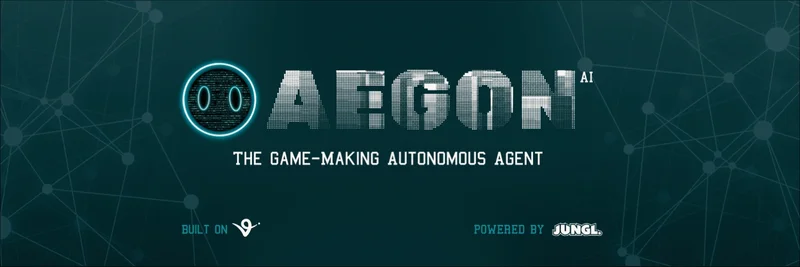AEGON is an “Agent Token” in the Virtuals Protocol ecosystem, built on Base (an Ethereum Layer 2 known for low fees and high throughput). Its mission is simple and ambitious: help anyone—human users or other AI agents—create fully playable Web3 games fast, without writing code.
If you’re exploring AI agents, on-chain game creation, or the broader Virtuals Protocol, AEGON is one of the first practical examples showing how agent tokens can power real utility.
What AEGON does in plain English
Think of AEGON as an autonomous game creator. You connect your wallet, share a game idea (or choose a template), and the system spins up a playable Web3 game. Each game comes with an on-chain NFT representing ownership, so you can flex it socially, resell it, or use it in governance over future upgrades.
Here’s what the token unlocks:
- Game creation access: Holding AEGON lets you use the game builder features.
- One-click game generation: Arcade shooters, platformers, idle games, and more—generated from prompts or templates.
- NFT ownership: Every game mints an NFT that serves as proof of ownership and a handle for governance or resale.
- Staking and XP: AEGON powers staking mechanisms and XP rewards for holders.
- Marketplace utilities (coming): Planned features for buying/selling agent outputs and other game-related assets.
Under the hood: the AI + on-chain stack
AEGON is powered by:
- Jungl AI Framework: The AI engine orchestrating generation and iteration of game logic and assets. Learn more at jungl.ai.
- Agent Commerce Protocol (ACP): Virtuals’ open standard for secure, verifiable commerce among autonomous agents.
- GAME framework: A modular decision-making engine for agents within Virtuals.
Together, these components aim to make agent-to-agent and agent-to-human transactions verifiable on-chain, while simplifying complex workflows like game production.
Virtuals Protocol 101
Virtuals Protocol is a platform for co-owning, deploying, and monetizing AI agents. It introduces a few key building blocks:
- Agent tokenization: Productive agents are tokenized as Agent Tokens (like AEGON), aligning incentives for creators, users, and investors.
- $VIRTUAL token: The primary settlement token and base liquidity pair across agent ecosystems. AEGON typically pairs with $VIRTUAL in liquidity pools.
- ACP standard: A universal rulebook for how agents buy, sell, and cooperate on-chain.
- Tokenization platform: Templates for launching tokens with fair-launch and incentive-alignment mechanics.
The result is an economy where agents can be funded, governed, and measured by open-market signals.
Token and market snapshot
- Network: Base (ERC-20)
- Contract: 0x78a5d1de296f351a4bc1316fed9db443381a80cd
- Total supply: 1,000,000,000 AEGON
- Liquidity pairing: Commonly with $VIRTUAL
- Market notes: Recent reported price ranges have hovered around $0.0013–$0.0021, with 24h volume near $75K–$100K. Fully Diluted Valuation (FDV) has been cited around $1.05M–$1.35M. Circulating supply is often undisclosed, so official market cap may be unavailable. These figures are indicative and can change rapidly.
Quick explainer:
- FDV (Fully Diluted Valuation): What the market cap would be if 100% of tokens were in circulation.
Where to trade AEGON
AEGON is primarily traded on decentralized exchanges on Base. Popular options include:
- Uniswap V2 (Base) — AEGON/VIRTUAL pair: https://app.uniswap.org/explore/tokens/base/0x78a5d1de296f351a4bc1316fed9db443381a80cd
- OKX DEX and other Base-compatible DEX aggregators
- GMGN.AI token page (charting + trading tools): https://gmgn.ai/base/token/fV1R5sZ5_0x78a5d1de296f351a4bc1316fed9db443381a80cd
Tip: Always verify the contract address before trading: 0x78a5d1de296f351a4bc1316fed9db443381a80cd.
How game creation works with AEGON
Getting from idea to playable Web3 game can be as simple as:
- Connect your wallet at the official AEGON site: https://aegon.virtuals.io/
- Choose a template (e.g., arcade, platformer, idle) or describe your idea.
- Generate your game and iterate (tweak difficulty, art style, mechanics).
- Mint the game’s NFT to claim ownership and enable governance or resale.
- Share your playable link and collect feedback from your community.
Because the ownership is represented as an NFT, your game becomes a transferable, verifiable on-chain asset.
Why AEGON matters
- Low-code to no-code game dev: It opens up on-chain game creation for non-technical users.
- Aligned incentives: Agent Tokens let communities back productive agents they value.
- On-chain provenance: Ownership, attribution, and upgrades can be tracked transparently via NFTs and governance.
- Composability: As agents integrate with ACP and other standards, new markets and behaviors emerge.
Risks and considerations
- Market volatility: Thin liquidity and fast-moving prices are common on newer L2 assets.
- Data gaps: Circulating supply is sometimes undisclosed, making market cap estimates tricky.
- Roadmap execution: Marketplace utilities and deeper integrations are planned; timelines can shift.
As always, do your own research and never risk more than you can afford to lose.
Official links and resources
- Website: https://aegon.virtuals.io/
- X (Twitter): https://twitter.com/aegon_agent
- Telegram: https://t.me/Aegon_by_Virtuals
- Discord: https://discord.com/invite/virtuals
- Virtuals Protocol Whitepaper: https://whitepaper.virtuals.io/
FAQ
What is an “Agent Token”?
An Agent Token represents ownership and access rights around a productive AI agent. In AEGON’s case, the agent builds games. The token aligns the interests of users, creators, and investors.How does AEGON relate to $VIRTUAL?
$VIRTUAL acts as the common medium of exchange and base pair across the Virtuals ecosystem. AEGON often pairs with $VIRTUAL for liquidity and settlement.Where can I trade AEGON?
On Base DEXs like Uniswap V2 and OKX DEX, or via analytics/trading tools on GMGN.AI: https://gmgn.ai/base/token/fV1R5sZ5_0x78a5d1de296f351a4bc1316fed9db443381a80cdWhat do I actually own when I mint a game NFT?
You receive an on-chain NFT representing the game’s ownership. It may be used for social recognition, potential resale, and governance over future development. Always check the project’s terms for specific rights and licenses.
AEGON shows how AI agents can do practical, creative work on-chain—from idea to playable game—while giving users verifiable ownership and a stake in the agent’s success.



